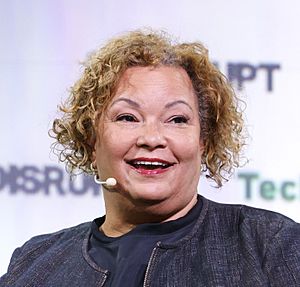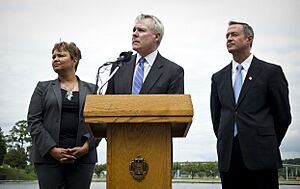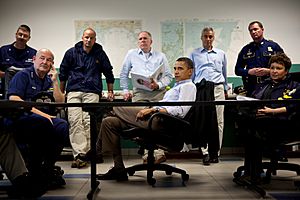Lisa P. Jackson facts for kids
Quick facts for kids
Lisa Jackson
|
|
|---|---|

Jackson in 2023
|
|
| 12th Administrator of the Environmental Protection Agency | |
| In office January 23, 2009 – February 19, 2013 |
|
| President | Barack Obama |
| Deputy | Bob Perciasepe |
| Preceded by | Stephen Johnson |
| Succeeded by | Gina McCarthy |
| Chief of Staff to the Governor of New Jersey | |
| In office December 1, 2008 – December 15, 2008 |
|
| Governor | Jon Corzine |
| Preceded by | Bradley Abelow |
| Succeeded by | Edward McBride |
| Commissioner of Environmental Protection of New Jersey | |
| In office February 28, 2006 – November 30, 2008 |
|
| Governor | Jon Corzine |
| Preceded by | Bradley Campbell |
| Succeeded by | Mark Mauriello |
| Personal details | |
| Born |
Lisa Perez
February 8, 1962 Philadelphia, Pennsylvania, U.S. |
| Political party | Democratic |
| Spouse | Kenneth Jackson |
| Children | 2 |
| Education | Tulane University (BS) Princeton University (MS) |
Lisa Perez Jackson (born February 8, 1962) is an American chemical engineer and a leader in environmental protection. She served as the head of the United States Environmental Protection Agency (EPA) from 2009 to 2013. She was the first African American person to hold this important position.
Before leading the EPA, Jackson worked for the New Jersey Department of Environmental Protection. She was appointed by New Jersey Governor Jon Corzine to be the state's environmental protection commissioner in 2006. She also briefly served as Governor Corzine's chief of staff.
In 2008, President-elect Barack Obama chose Jackson to lead the EPA. The United States Senate confirmed her appointment in January 2009. During her time at the EPA, Jackson worked on making cars more fuel-efficient. She also helped the EPA respond to the Deepwater Horizon oil spill. She recognized carbon dioxide as a threat to public health. This allowed the EPA to set new rules for greenhouse gases. She also suggested stricter limits for air pollution. Jackson stepped down from her role as EPA Administrator in February 2013.
Contents
Lisa Jackson's Early Life and Education
Lisa Jackson was born in Philadelphia in 1962. She was adopted by Benjamin and Marie Perez. She grew up in New Orleans, Louisiana, in a neighborhood called Pontchartrain Park. In 1979, she graduated at the top of her class from St. Mary's Dominican High School.
Jackson received a scholarship from the National Consortium for Graduate Degrees for Minorities in Engineering & Science. This helped her get an early start in college. She attended Tulane University with a scholarship from Shell Oil Company. She earned a Bachelor of Science degree in chemical engineering in 1983. Later, she earned a Master of Science degree in chemical engineering from Princeton University in 1986.
Lisa Jackson is married to Kenneth Jackson. They have two children together.
Starting Her Career in Environmental Protection
As a child, Lisa Jackson became interested in environmental issues. This happened after learning about the Love Canal Disaster. This event involved a community built on a toxic waste dump.
In 1987, Jackson began working for the United States Environmental Protection Agency (EPA). She started as an engineer in Washington, D.C. She later moved to the EPA's New York City office. There, she worked on cleaning up hazardous waste sites. She helped create rules for cleaning up dangerous waste. She also managed large cleanup projects in New Jersey.
After 16 years with the EPA, Jackson joined the New Jersey Department of Environmental Protection (DEP) in 2002. She worked as an assistant commissioner. She managed programs related to land use, water supply, and water quality. She focused on encouraging smart growth in the right places.
Leading Environmental Efforts in New Jersey
Jon Corzine, the Governor of New Jersey, chose Lisa Jackson to lead the New Jersey Department of Environmental Protection. In this role, she managed a team of nearly 3,000 people. Their job was to protect and improve New Jersey's land, air, and water. She also oversaw state parks, beaches, and wildlife programs.
As commissioner, Jackson led efforts to improve environmental conditions in cities like Camden and Paterson. These cities had many working-class families and people of color. They had been greatly affected by pollution. She worked with local and federal officials to conduct many environmental inspections. These efforts aimed to ensure businesses followed environmental rules.
In late 2008, Governor Corzine asked Jackson to serve as his Chief of Staff. This meant she would be his main advisor. However, she only held this position for a short time. President-elect Barack Obama soon nominated her to lead the EPA.
Leading the Environmental Protection Agency

On December 15, 2008, President-elect Barack Obama announced Lisa Jackson as his choice to lead the Environmental Protection Agency. The United States Senate confirmed her on January 22, 2009. She became the first African American to serve as EPA Administrator. She was also the fourth woman to hold the role.
As EPA Administrator, Jackson promised to focus on key issues. These included protecting air and water quality. She also aimed to prevent exposure to toxic pollution. A major goal was to reduce greenhouse gases. She emphasized using the best science and being open about decisions. She also made it a priority to protect vulnerable groups. This included children, the elderly, and low-income communities. These groups are often more affected by environmental threats.
Jackson was the first EPA administrator to focus on updating the Toxic Substances Control Act of 1976. This law helps regulate chemicals. She believed the law needed to be stronger and more modern.
In 2009, Jackson stated that carbon dioxide and other greenhouse gases threaten public health. This finding allowed the EPA to start setting rules for these emissions.

After the Deepwater Horizon drilling rig explosion in 2010, Jackson's agency oversaw the environmental response. This included monitoring air and water quality. They also assessed the damage to aquatic life. The EPA approved the use of special substances called dispersants to break down the oil. Jackson explained that using dispersants was a difficult choice. It was an "environmental tradeoff" to deal with the massive oil spill. She also led the Gulf Coast Ecosystem Restoration Task Force. This group worked to restore the damaged ecosystem in the Gulf of Mexico.
In 2011, Jackson proposed stricter limits for air pollution standards. This plan aimed to make the air cleaner for everyone. There were discussions about how to balance environmental protection with economic concerns. President Obama ultimately decided to implement a less strict version of the standards. Jackson respected his decision and continued to work on improving air quality.
Jackson also spoke about the proposed Keystone Pipeline. This was a large project to transport oil. She said it was important for the country to have a big conversation about such projects. She urged caution, noting the pipeline's significant impact.
She also defended the EPA's authority to regulate greenhouse gas emissions. This power came from the Clean Air Act. She argued that strong environmental policies are important for America's future. She believed that protecting air and water would not harm jobs. Instead, it would prevent health threats to children.
During her time at the EPA, Jackson faced different views on environmental regulations. Some, like Senator Jim Inhofe, questioned the EPA's rules. They worried about the impact on industries like coal. Jackson consistently stated that the science behind climate change is clear. She believed that human activity causes global warming.
On December 27, 2012, Jackson announced she would step down. She left her position as EPA Administrator on February 15, 2013.
Working at Apple
In 2013, Lisa Jackson joined Apple Inc.. She became the vice president of Environment, Policy, and Social Initiatives. In this role, she reported directly to CEO Tim Cook. She led Apple's efforts to be more environmentally friendly. This included working on renewable energy and reducing waste. Apple announced in December 2025 that she retired in January 2026.
Awards and Honors
- Member of the American Academy of Arts and Sciences, elected 2021
 | Charles R. Drew |
 | Benjamin Banneker |
 | Jane C. Wright |
 | Roger Arliner Young |

